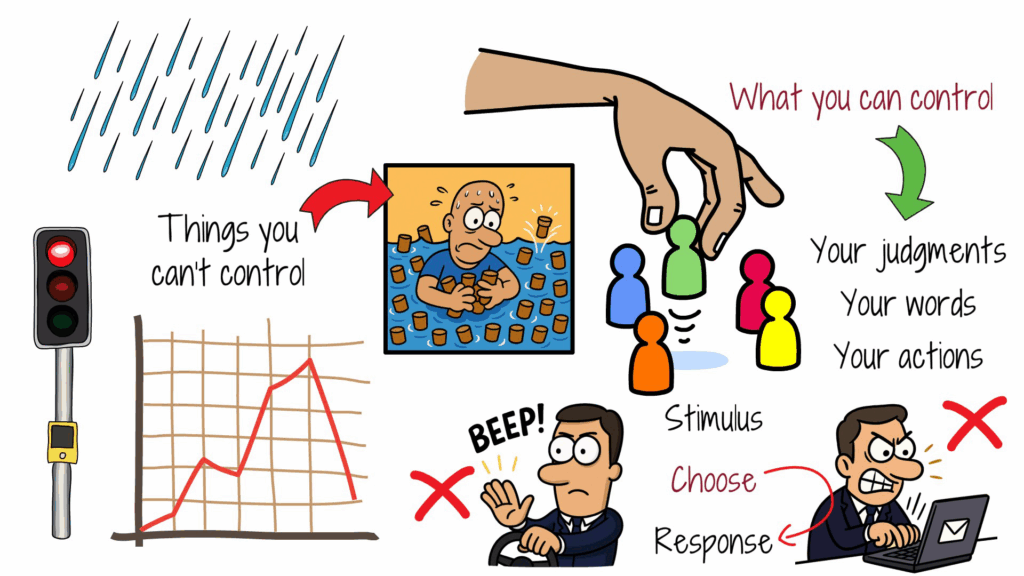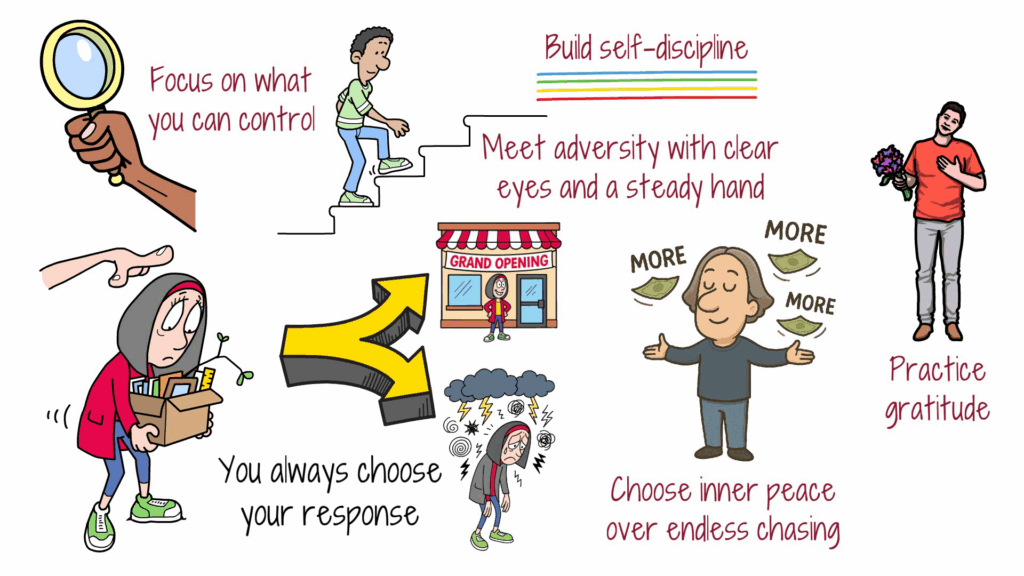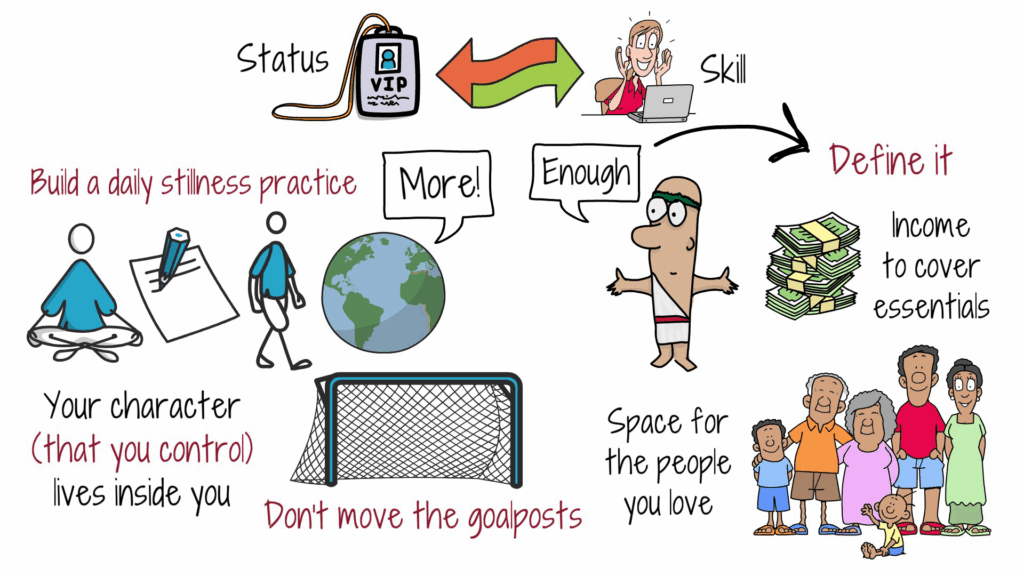Stoic Philosophy was practiced in Ancient Rome and Greece. It promotes living a virtuous life, by means of ethical and personal character development.
But what does that mean for people living in a modern world, far removed from the early civilizations of the Ancient Stoics? You might be wondering if there’s anything you could learn from such old philosophical thoughts.
As it turns out, there’s quite a lot that applies to the challenges of today. Many great athletes, political and military leaders, as well as poets, have embraced the tenets of Stoicism to help them achieve their highest goals and potential.
Learning these ideas as a foundation for how you view life, and how you act in any situation, can be profound.
Focus On What You Can Control
Living in the modern world can feel chaotic, frustrating, and out of your control. Truth is, much of life really IS out of your control. And spending your time and energy fighting it can be exhausting. One of the most enlightening thoughts about Stoicism, is to focus on what you can control.

Being in control of your life can help you feel safe, confident, and powerful. But here’s the thing, much of what you experience in life is outside the sphere of your control. So trying to control everything is like trying to keep 100 corks underwater all at the same time. It’s an impossible feat, because something is always going to keep popping up.
So what do you do to control your life? You control yourself. The only thing that is in your power is you. You can’t control the weather, the circumstances, or what other people say or do. But you do have control over how YOU think, speak, and act.
Stoicism addresses this as one of the most important aspects of self development. For example, if you find yourself stuck in traffic, and find the overwhelming feeling of frustration coming over you, you don’t have to react with anger. You obviously can’t change the situation. You can’t force other cars out of your way. But what you can do is calm yourself.
Listen to a podcast, reflect on something you love to do, or practice breathing exercises. Make use of the time you have while waiting for the traffic jam to clear.
Austrian Psychologist, Viktor Frankl, wrote,
“Between stimulus and response there is a space. In that space is our power to choose our response.”
This is where the Stoic Virtue of Wisdom can help you to choose the thoughts, words, and actions that can make the best of the situation you’re in. Instead of getting mad, screaming at the other drivers or cursing the Universe, make a different choice. One that won’t destroy your own health and sanity.
Acknowledge Adversity
The term, “Amor Fati” is a Latin phrase that means, “Love of One’s Fate.” In other words, whatever happens, whether you consider it good or bad, accept it. All situations in life are part of the journey, and it comes back to what you can or can’t control.

It’s pretty easy to accept things that feel good to you, and have an outcome that you had hoped for. But what about those times when things don’t feel so good, and may even seem devastating? As difficult as it may be, the challenges of life are often opportunities to practice the Stoic principle of “Amor Fati.”
For example, Marcus Aurelius wrote,
“The impediment to action advances action. What stands in the way becomes the way.”
When facing any form of adversity or setback, the problem or situation becomes the lesson. And the action you choose can promote growth.
One way to practice dealing with adversity is to create it yourself. For example, taking cold showers can teach you to handle physical discomfort. But many times, adversity shows up on its own, without warning. Envisioning worse case scenarios can help you prepare for unfortunate events and have a plan for what you would do if it really happened so you won’t be blindsided when it does.
Sometimes adversity is something that’s hard to even prepare for. Having a belief you can fall back on might be your only option.
In his book, Courage under Fire, James Stockdale gives insight to how he survived horrible conditions as a Prisoner of War. This thought process became known as “The Stockdale Paradox.” Stockdale had embraced Stoic principles that helped him to endure adversity in an extreme situation.
This technique combines the ability to confront the brutal facts of your current reality, while maintaining an absolute belief that you will prevail in the end, no matter how distant that is.
Most people will never experience this kind of adversity, but the same principle applies to any type of difficult situation that you find yourself in. Rather than ignoring or resisting the problem, Stoic philosophy encourages you to acknowledge it, consider what you can control, and apply your thoughts, words, and actions carefully.
Accepting what’s happening doesn’t mean you approve of the situation. It means you acknowledge the reality of it and do what you need to do in the moment, knowing that everything changes eventually.
Develop Self Discipline
Controlling your impulses and making rational decisions are the basis of self discipline. Self discipline is the basis for what you can control, which of course, is just you.

For example, train your body to get up and exercise when you tell it to. Or make rational decisions about what’s in your best interest. If you leave it up to what you feel like doing at any given time, you may find yourself not getting things done that you want to do, or making poor choices. Your brain likes to take the easy way out. Remember who’s the boss. You are in control of you.
Another example is not saying something that will cause problems for you later. “Is it true? Is it kind? Is it necessary?” If not, use your impulse control to keep it to yourself.
Cultivate Gratitude
Regularly appreciating what you have is the flip side of embracing adversity.
Having gratitude for things you are thankful for helps you stay balanced and reminds you of the good things in life. Even seeing gratitude from other people’s perspective when they are receiving, can be beneficial to you.
Gratitude can be overlooked when you get caught up in life’s difficulties. But when you intentionally acknowledge gratitude, it can help you to see a more complete picture. Keep a journal of what you’re thankful for. By being grateful on a regular basis, you’ll start to see even more things to be grateful for.
Value Inner Peace Over External Success
Seek contentment from within rather than through material possessions. When it comes to material things, Seneca said,
“You ask what is the proper limit to a person’s wealth? First, having what is essential, and second, having what is enough.”
Philosopher, Aristotle, referred to this as “the golden mean.” It’s that sweet spot in the middle of the road, where your external success is equally balanced with your inner contentment.

For example, in a workplace scenario, if your job is making you feel stressed but you hang onto it in “velvet handcuffs”, because of the money you’re making, you may want to rethink what you “want or need” materially, and how it affects your inner peace.
What could you do instead? Either rethink how you approach your current job, or consider doing something else that you would like better.
A daily practice of meditation can help calm your mind. It’s easier to hear your inner rational voice when outside chatter is muted. Think about how you feel when you are relaxed and at peace. And ask yourself if the success you’re looking for is in alignment with a healthy lifestyle.
Final Thoughts
Doing the right thing is key. Do the best you can, within your control, and the outcome will take care of itself. Even if the outcome is not of your liking, the Stoic principles have suggestions on how to stay centered in any situation. Your health, both physical and mental, is influenced by the choices you make.
Using the Stoic Virtues of wisdom, temperance, courage and justice, you can find guidance that can change the way you live.
